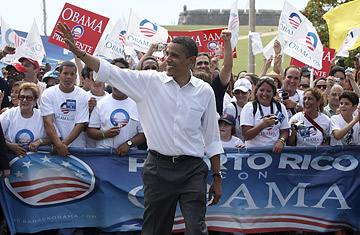
Barack Obama waves to supporters during a rally campaign event in San Juan, Puerto Rico.
Puerto Rico won't be a swing state in November. It's not even a state, and its 4 million residents aren't allowed to vote in the general election. Its partisan politics have little in common with the mainland's; the main competitors are not Democrats and Republicans, but "commonwealthers" and "statehooders," and while they are divided into reds and blues, the reds of the commonwealth party are more likely to favor Democrats, while the blues of the statehood party skew more Republican. Puerto Rico residents do serve in the U.S. military, but they do not pay U.S. income taxes, and many of them will not root for the U.S. Olympic team this summer, because they've got their own.
In other words, Puerto Rico's June 1 Democratic primary is the kind of contest that Hillary Clinton's campaign would dismiss as meaningless if Barack Obama were favored to win it. But Clinton is favored to win it easily, so she's casting it as an important test of strength among Hispanic voters, and she campaigned there this past holiday weekend. There will actually be 55 delegates at stake, more than in most state primaries, so it won't be meaningless. And it will be unique, because Puerto Rican politics always are. "Politics is our national pastime," says Miguel Lausell, a commonwealther power broker who ran Ted Kennedy's Puerto Rico primary campaign in 1980, and now supports Clinton. "One thing you have to say about Puerto Ricans, we love to vote."
The United States seized the archipelago of Puerto Rico from Spain in 1898, but most boricuas still speak Spanish at home. It is now a semi-autonomous commonwealth, separate and not quite equal. Its residents are U.S. citizens, and they do pay U.S. payroll taxes and receive Social Security benefits, but their sole representative in Congress has no voting power — and when it comes to presidential elections, they have no voting power either. Puerto Ricans narrowly voted to maintain the status quo in three non-binding plebiscites, most recently in 1998, but the status question is still the dividing line that dominates the island's politics.
In the 1980 battle, Puerto Rico's last contested primary, President Jimmy Carter's aides lured statehooders with promises of a new plebiscite, while most commonwealthers lined up behind Senator Kennedy. But the Clinton and Obama campaigns have been trying to unite supporters across party lines, while still exploiting the island's powerful party machines. "This is all brand-new for us," says Obama's national field director, Temo Figueroa. "We're used to grassroots politics, get the names, get the emails, but here you really have to work within their system. You've got to get to the right mayor. You've got to make sure the staff working with the statehooders are wearing blue."
Clinton and Obama have both pledged to support self-determination for Puerto Rico, which appeals to both parties, although Obama has suggested that he supports a constitutional assembly to address the issue, a bit of a shout-out to commonwealthers. Obama has snagged the endorsement of Gov. Anibal Acevedo Vila, who presides over the commonwealth party's machine, and is running for reelection even though he's under indictment for campaign finance violations, allegations which he denies. But commonwealthers like former Gov. Carlos Romero Barcelo support Clinton, as does Senate President and statehooder Kenneth McClintock, while the statehooder vying to represent Puerto Rico in Washington is with Obama. Current representative Luis Fortuño, a statehooder who is challenging Gov. Vila, is already a delegate for Senator John McCain. (Incidentally, McCain adviser Charlie Black is known as the G.O.P. lobbyist to see in Washington when it comes to Puerto Rico issues.) The unorthodox cross-party appeals being made by both Clinton and Obama has brought a new phenomenon to Puerto Rico's politics; at Clinton rallies in Ponce and Vieques, commonwealther mayors and their statehooder challengers have introduced each other. "It's really an exhilarating experience," McClintock says. "It's not easy to build those bridges around here."
An independent poll in April gave Clinton a 50-37 advantage, and McClintock says he thinks the margin has expanded. As a New York Senator, Clinton already represents many of the 4 million Puerto Ricans who live on the mainland; her husband was always popular on the island, and even commuted the sentences of 16 members of a violent Puerto Rican nationalist group when she ran for Senate. Puerto Ricans pay more attention to local politics than national politics, but they certainly know Hillary Clinton; by contrast, Obama has been running biographical radio ads on the island this week. "We have a huge mountain to overcome," Figueroa says. "But we're going to compete."
In Puerto Rico, that means schlepping through caminatas, a kind of political parade that requires candidates to walk through neighborhoods, and hiring the right tumbacocos, trucks loaded with giant speakers that blast campaign propaganda loud enough to knock coconuts out of trees, which is how they got their name. It means producing official campaign salsa and reggaeton songs; Clinton seems particularly proud of her endorsement from salsa legend Willie Colon. "It's never dull," says Metro San Juan magazine editor Philipe Schoene Roura, author of an upcoming book about Puerto Rico politics. "It's not the kind of politics that Americans are used to."
Of course, Puerto Ricans are Americans, too, and most of them want to stay that way; the independence party has never received 5% of the vote in any plebiscite. But many of them still want to protect their own culture, their own language, their own candidate in Miss Universe competitions, which they've won an extraordinary five times. And most mainland politicians seem more or less satisfied with the quasi-colonial status quo. So while on June 1 Puerto Ricans will exert more influence than they've ever had before in U.S. politics, by June 2, they'll still lack the right to vote for their commander-in-chief.
